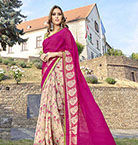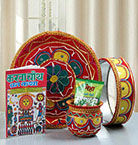Origin of Karwa Chauth Celebration
Karwa Chauth is an important festival for all married women. From sunrise to moonrise, the wives keep a fast for the safety of their husbands. Keeping a fast without drinking water and eating any food throughout the day is not easy, but the doting wives perform all these rituals with much love and respect for their husbands.
If we talk about the literal meaning of Karwa Chauth, it means offering ‘Argya’ to the moon using an earthen pot known as Karwa on the Chaturthi of the Karthika month. The festival falls on the fourth day of the dark fortnight in the Kartika month every year. Though the origin of this festival is still very hazy, there are some anecdotes associated with it. Listed below are some of the popular Karwa Chauth stories which show the reason behind this celebration:
Karva Chauth Story of Queen Veervati: Once upon a time there was a beautiful queen named Veervati who was the only sister among seven loving and caring brothers. On her first Karwa Chauth, she was at her parent’s place and began a strict fast after sunrise. In the evening, she was waiting eagerly for the moonrise as she was suffering from hunger and thirst. Seeing her suffering like this, pained her brothers. So, they installed a mirror in a Peepal tree that made it look as if the Moon is up in the sky. Now, the moment Veervati broke her fast, the news that her husband was dead arrived. She kept on weeping and was inconsolable. She instantly started home and met Goddess Parvati on her way. Maa Parvati revealed that she was tricked by her brothers. Then, she kept Karwa Chauth fast with full devotion and seeing her dedication, Yama, the lord of death restored life to her husband. This Karva Chauth Katha of Queen Veervati is quite popular and usually heard by women observing the fast.
Karwa Chauth Story of Queen Draupadi: Next on our list of Karva Chauth Kahani is based on Arjuna and Draupadi from the Mahabharata. Once Arjuna, the one whom Draupadi loved the most, went to the Nilgiri mountains for self-penalty. Due to this, the rest of the brothers were facing challenges without him. Now, Draupadi remembered Lord Krishna in this situation to ask what should be done to resolve the challenges. Lord Krishna narrated a story of Goddess Parvati who (in a similar situation) performed the Karwa Chauth rituals. So, Draupadi followed the strict rituals of Karwa Chauth for the well-being of her husband and Pandavas resolved their problems.
Karwa Chauth Story of Karwa: There was a woman named Karwa who was deeply in love with her husband and this intense love gave her lots of spiritual powers. Once when her husband went to bathe in the river, he was attacked by a crocodile. Now the courageous Karwa bound the crocodile with cotton yarn and remembered Yama; the Lord of death. She asked Lord Yamraj to give life to her husband and death sentence to the crocodile. He said he was afraid he couldn’t do so. However, in return, Karwa threatened to curse Lord Yama and destroy Yamdev. Yama was seriously afraid of being cursed by such a devoted and doting wife and thus he sent the crocodile to hell and gave life back to her husband.
This Karva Chauth kahani has narrated even today and married women pray to Karva Mata for the well-being and happiness of their husbands.
Karva Chauth Story of Satyavan and Savitri: It is said that when Yama, the God of death, came to acquire Satyavan's life, Savitri begged in front of Yama to grant him life. But Yama was adamant and saw that Savitri stopped eating and drinking and followed Yama as he took her husband away. Yama now said to Savitri that she could ask for any boon except the life of her husband. Savitri, being a very smart woman, asked Yama that she wanted to be blessed with children. And since she was a devoted and loyal wife, she wouldn't let any kind of adultery. Thus, Yama had to restore life to Satyavan so that Savitri could have children.
On the day of Karva Chauth, women and girls observing the fast do not miss hearing Karva Chauth Katha of Savitri. Besides, listening to all the Karva Chauth stories emphasizes the importance of this fast and how ancient this festival is.
Why do We Celebrate Karwa Chauth?
Given the aforementioned Karva Chauth Katha, you would now be well-versed with the fact why the festival holds utmost importance in the Hindu culture. The prominence of this festival can be widely observed in the North and North Western regions of our country. A massive chunk of the male population of these regions were the soldiers of the Indian Army and officials of the Military Forces and for the safety of these people, women of these regions started fasting. These armed forces, policemen, soldiers, and military personnel protected the country from enemies and the women used to pray to God for the longevity of their men. The time of this festival coincides with the initiation of the Rabi cropping season which is the wheat sowing season in these aforementioned areas. The women of the families fill the earthen pot or Karwa with wheat grains and offer them to God praying for a great Rabi season.
In ancient India, women of 10-13 years of age were married. Hardly they could enjoy their childhood or early teenage in such a marriage. Communication was also a big obstacle in those days. So, they couldn't come to their parent's homes easily and it was also not considered good. So, from an early age, a woman had to take full responsibility for a new household. From cooking to cleaning, she was the in-charge. But, she was all alone away from her loved ones in an unknown house and without any friends too. Where would she go while feeling alone or missing home? So, to resolve this problem, the women started celebrating Karwa Chauth in a grand way where married women of the whole village and some nearby villages used to congregate in one place and spend the day in joy and laughter. They befriended each other and called each other God-friends or God-sisters. One can say that this festival started as a means of enjoyment and to forget the fact that they are alone at their in-laws' place. They celebrated the union among themselves on this day and gifted each other bangles, lipsticks, sindoor, etc. to remind each other that there is always a friend somewhere.
In recent times, husbands have also started observing fasts for their wives. The gesture has made the festival extra-special as it signifies love, understanding and compassion from both ends.






